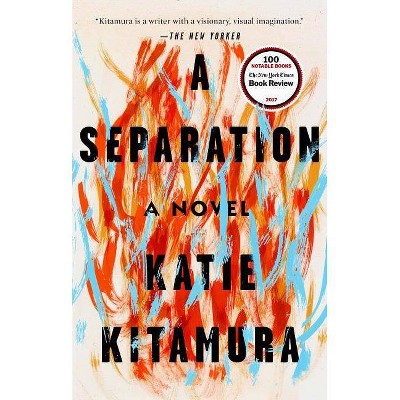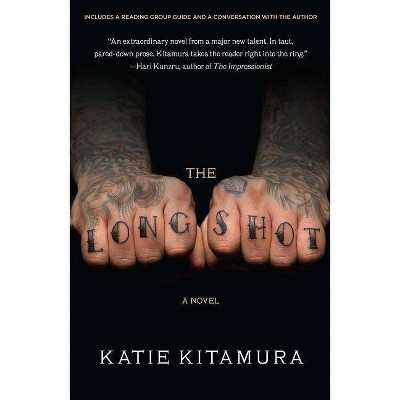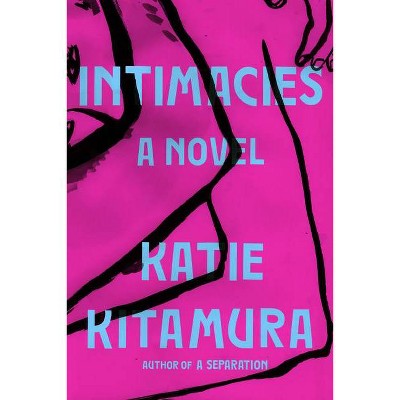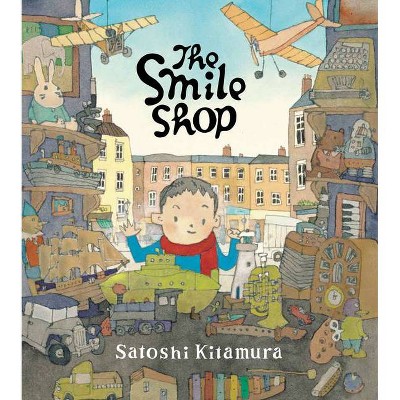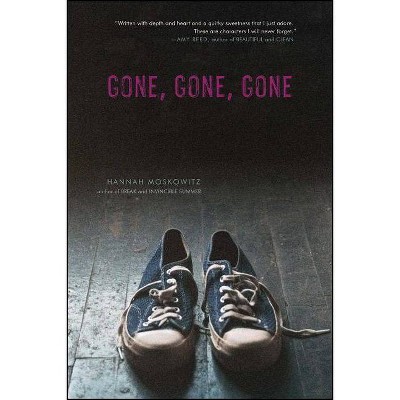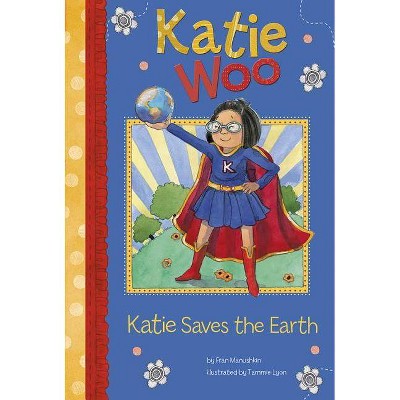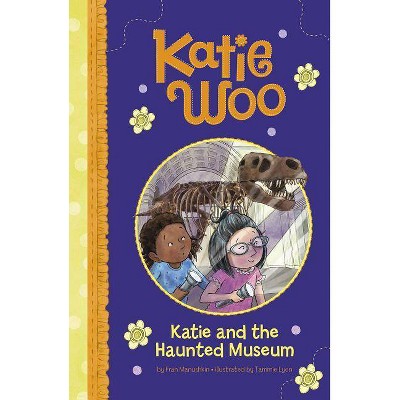Gone to the Forest - by Katie Kitamura (Paperback)
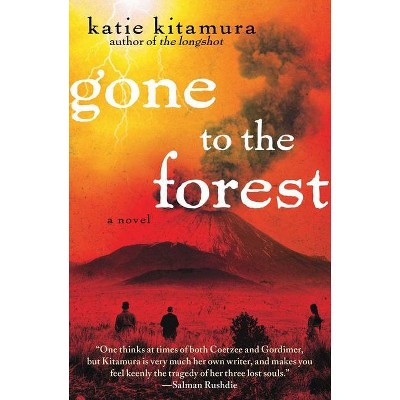
Similar Products
Products of same category from the store
AllProduct info
<p/><br></br><p><b> About the Book </b></p></br></br>From the New York Public Library Young Lions Fiction Award finalist and critically acclaimed author of "The Longshot," a gripping, psychologically intense novel about the destruction of a family, a farm, and a country.<p/><br></br><p><b> Book Synopsis </b></p></br></br><b>*<i>San Francisco Chronicle</i> Best Book of 2012<br>*<i>Financial Times</i> Best Book of 2012<br>*<i>New Yorker</i> Best Book of 2012</b> <p/>FROM THE CRITICALLY ACCLAIMED AUTHOR OF <i>THE LONGSHOT</i> comes this gripping saga about the destruction of a family, a home, and a way of life. Set on a struggling farm in a colonial country teetering on the brink of civil war, <i>Gone to the Forest </i>is a tale of family drama and political turmoil in which fiery storytelling melds with daring, original prose. Since his mother's death, Tom and his father have fashioned a strained domestic peace, where everything is frozen under the old man's vicious control. But when a young woman named Carine arrives at the farm, the tension between the two men escalates to the breaking point. Hailed by the <i>Boston Globe </i>as "a major talent," Kitamura shines in this powerful new novel.<p/><br></br><p><b> Review Quotes </b></p></br></br><br><i>"Gone to the Forest</i> is a stark, urgent, beautiful novel. Katie Kitamura merges history and fable to create an explosive narrative about people trapped by terrible events they cannot control, but in which they are also deeply implicated. Its themes are ambitious--guilt and innocence, power and submission, meaning and nonsense. The characters and images of <i>Gone to the Forest</i> continue to haunt me, a tribute to their lasting emotional power and their creator's extraordinary gifts."--Siri Hustvedt, author of The Summer Without Men<br><br><i>Gone to the Forest</i> is a mesmerizing novel, one whose force builds inexorably as its story unfolds in daring, unexpected strokes. Kitamura's prose brings to mind Cormac McCarthy or Jean Rhys, but the music of these lines is all her own--lyrical, sharp-edged, spare, and unafraid. Be warned: you'll find yourself reading long past midnight, out of breath and wide awake. This is a bold and powerful book.<br><i></i>--Julie Orringer, author of The Invisible Bridge<br><br><i>Gone to the Forest</i> is Katie Kitamura's second novel, about a family and the cost of European colonization in an unknown time and place... that recalls, at first and most often, J.M. Coetzee's South Africa. Kitamura writes with fine tension and clipped grace. Her observations are subtle and sharp. The volcano's importance in the story evokes Aime Cesaire's poem <i>Corps Perdu, </i>which begins, 'Moi, qui Krakatoa<i> </i>...' and is a soaring command, in the wake of decolonization, for 'the islands to be.' [She is a] rising literary star.-- "The Spectator"<br><br>"Hypnotic prose [with] flashes of unexpected beauty... so spare as to almost be incantatory... It marvelously suggests the chaotic, contradictory and highly changeable way the mind works.... <i>Gone to the Forest</i>, in just 200 pages, floats, unfolds and astonishes."<br>-- Marie Myung-Ok Lee, <i>San Francisco Chronicle </i>on <i>Gone to the Forest</i> <p/>"Kitamura offers echoes of J. M. Coetzee's <i>Disgrace</i>, coolly chronicling the family's undoing as it tracks against the politicalturmoil ripping through the nation." <br>--<i>New York Times </i> on <i>Gone to the Forest</i> <p/>"A ruthless, controlled style distinguishes this novel about a man and his oppressive father in an unnamed colonial country that's about to blow... [Kitamura's] style reminds one of Marguerite Duras and Herta Müller--writers who have had to reckon with power in the colonial Indochina and the repressive Romania, respectively. Power is the subject, and the execution is precise."-- "The Daily Beast"<br><br>"I have been in a daze ever since I finished this book. <i>Gone to the Forest </i>is superb. It is so beautifully written, so balanced - there isn't a spare sentence or word in the whole thing. Utterly distinctive, it is almost allegorical in its force. Kitamura is of the best living writers I've read, and she gives the dead ones a run for their money."--Evie Wyld, author of After the Fire a Still Small Voice<br><br>"In this wondrous tale of both a family and a country's dissolution, Kitamura brings readers into an unspecified time in an unnamed colonial country ... Kitamura, with spare, mesmerizing prose, paints a memorable vision of emotional chaos echoed by geologic and political turmoil."<i> </i><br>-- <i>Publishers Weekly</i>, (starred review) on <i>Gone to the Forest</i> <p/>"[Kitamura's] unidentified place and time, and the actions and motivations of these three human cyphers, ensure that readers will be pondering <i>Gone to the Forest </i>long after they finish that final sentence."-- "Booklist"<br><br>"Katie Kitamura is a major talent. It is not often I read a book of controlled, illuminating, prose and it is even more rare that the story therein survives the style. I was reminded of the writings of Herta Müller and J.M. Coetzee, both important storytellers of our time and vanguards of form. Kitamura's spare, elegant and affecting work in <i>Gone to the Forest</i> brings the reader in and out of the nexus of three souls caught in a nameless land, in a nameless time, and gently observes as they try to give name to their relation to one another, to the land, to the times and to themselves. <i>Gone to the Forest</i> is a book of atmospheres and moods, details and desires and Kitamura handles the nuances with the grace and confidence of a writer beyond her years."--Laleh Khadivi, author of The Age of Orphans<br><br>"Kitamura's words are tough, and her characters are tied to the tails of wounded beasts: mother countries, the land itself, and hierarchies both out of steam and out of date... Kitamura makes the end of history--many histories--seem both casual and immediate."<br>--Sasha Frere-Jones, NewYorker.com on <i>Gone to the Forest</i> <p/>Katie Kitamura expertly melds the personal and political in one of the year's most unforgettable novels. <br>--Largehearted Boy on <i>Gone to the Forest</i> <p/>"Striking... Beautifully written... Kitamura's carefully wrought characters are captivating."-- "Hyphen Magazine"<br><br>[Kitamura's] new novel, like "The Longshot," pries open, with rare insight and compassion, the dangerous vulnerability, the wounding woundedness, that defines her men....Kitamura displays an uncanny talent for getting inside the body talk of unrevealing people...What Kitamura summons brilliantly is the sensation of a repressed and repressive society laid bare -- erotically, psychologically and politically. She writes with equal authority about the weight of a man's gaze on a disrobing woman and the sensation of being exposed by history's glare....[Gone to the Forest] confirms Kitamura's prodigious talent.-- "The New York Times Book Review"<br><br>Darkly seductive-- "Vogue UK"<br><br>The death-throes of a colonial world captured in dark, obsessive prose, punctuated by images of strange, surreal beauty: the falling ash, the river of dead fish. One thinks at times of both Coetzee and Gordimer, but Kitamura is very much her own writer, and makes you feel keenly the tragedy of her three lost souls.<br>-- Salman Rushdieon <i>Gone to the Forest</i> <p/>A watchful and magnificent work. From the first page, Kitamura is in complete control, both of the prose and of the story it carries. She is a skilled hunter and we are her helpless prey.--Teju Cole, author of Open City<br><br>With spare and deliberateprose, Kitamura brings this fable of power's illusions to a stunning, breathtaking conclusion. Along the way ... she shows why she has earnedcomparison to great writers like Nadine Gordimer and Herta Müller. <i>Gone tothe Forest</i> is a beautiful, indelibledepiction of the horror of primal impulses.-- "Shelf Awareness"<br><br><b>"</b>What Kitamura summons brilliantly is the sensation of a repressed and repressive society laid bare - erotically, psychologically and politically. She writes with equal authority about the weight of a man's gaze on a disrobing woman and the sensation of being exposed by history's glare ... Gone to the Forest confirms Kitamura's prodigious talent."-- "The New York Times Book Review"<br><br>"A startling, discomfiting work, written in razor-sharp prose. J.M. Coetzee's work comes to mind, as does Michael Haneke's, but there's a sweet coldness here that is all Kitamura's. This is her second novel, a brilliant book early in what will surely be a major career."--Teju Cole "Financial Times, Best Books of 2012"<br><p/><br></br><p><b> About the Author </b></p></br></br><b>Katie Kitamura </b>is based in New York. She has written for numerous publications, including <i>The New York Times</i>, <i> Wired</i>, and <i>The Guardian</i>, and is a regular contributor to <i>Frieze.</i>
Price History
Price Archive shows prices from various stores, lets you see history and find the cheapest. There is no actual sale on the website. For all support, inquiry and suggestion messages communication@pricearchive.us
